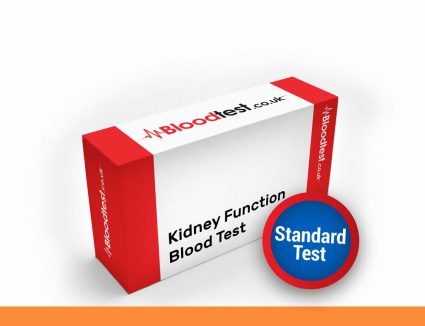Comprehensive Guide to Understanding Kidney Blood Tests: Essential Insights for Your Health
Unveiling the Significance and Purpose of Kidney Blood Tests

A kidney blood test in Barry serves as a crucial diagnostic instrument, meticulously assessing various substances present in your bloodstream to provide vital insights regarding your kidneys' health and functionality. This essential test quantitatively measures the levels of waste products and significant chemicals, notably creatinine and urea, which are key indicators of your kidneys' performance. The kidneys' primary role involves filtering out toxins and excess substances from the blood, highlighting the importance of consistently monitoring their function. By evaluating these critical levels, healthcare professionals can establish a health baseline, track changes over time, and identify potential health issues at an early stage. Familiarising yourself with the components of a kidney blood test is an empowering step towards managing your kidney health and overall well-being effectively.
Curious to Learn More About This Test?
https://bloodtest.co.uk/wp-content/uploads/Kidney-Blood-Tests-in-Barry.wav
 Understanding Why Kidney Blood Tests are Crucial for Optimal Health Management
Understanding Why Kidney Blood Tests are Crucial for Optimal Health Management
Kidney blood tests are indispensable elements of modern healthcare, particularly in the UK, as they fulfil numerous vital functions. Primarily, these tests are essential for the early identification of kidney diseases, enabling timely interventions that can significantly improve patient outcomes. Conditions such as Chronic Kidney Disease (CKD) often develop insidiously and may not present obvious symptoms, thereby emphasising the importance of early detection. Additionally, regular testing is imperative for monitoring existing kidney conditions, assisting healthcare providers in recommending appropriate treatments and lifestyle modifications. For patients undergoing treatments that could impact renal function, such as specific medications or chemotherapy, these tests become invaluable in evaluating treatment efficacy and making necessary adjustments. Recognising the significance of kidney blood tests in Barry empowers individuals to take proactive measures in safeguarding their health and enhancing their quality of life.
Determining the Optimal Frequency for Kidney Blood Tests
The advised frequency for kidney blood tests can greatly differ based on individual risk factors and pre-existing health conditions. For most adults, routine testing every one to two years is generally recommended, particularly for those over 65 or with a family history of kidney disease. However, individuals with underlying health concerns, such as diabetes or hypertension, may require more frequent assessments to closely monitor their kidney health. It is essential to have a discussion with your General Practitioner (GP) regarding your health history and any relevant risk factors, as they can provide tailored recommendations suitable for your testing schedule. By adopting these proactive health measures, you can identify and address potential kidney problems early, thereby preserving optimal kidney function and overall health.
Deciphering Your Kidney Blood Test Results: A Comprehensive Overview

Interpreting the results of a kidney blood test in Barry can initially seem daunting, yet it is vital for understanding your kidney function. Key markers such as creatinine, urea, and electrolytes are assessed to evaluate how effectively your kidneys filter blood. Typical creatinine levels usually fall between 0.7 to 1.3 mg/dL for men and 0.6 to 1.1 mg/dL for women. Any deviations from these established thresholds may indicate potential kidney dysfunction, warranting further investigation and additional testing. It is crucial to bear in mind that abnormal results do not automatically lead to definitive diagnoses; instead, they act as indicators that may necessitate further scrutiny. Educating yourself about these results empowers you to actively engage in your health management journey.
Effective Preparation for Your Kidney Blood Test: Key Considerations
Important Steps to Follow Before Your Kidney Blood Test
Proper preparation for a kidney blood test in Barry is essential to ensure the accuracy of your results. Your healthcare provider may advise fasting for a specific period prior to the test, typically between 8 to 12 hours, contingent on the tests being performed. It is critical to inform your healthcare provider about any medications you are currently taking, as some may impact the test results. Furthermore, notifying them of any recent illnesses or health changes is vital, as these factors can influence both the results and the need for further testing. By adhering to these preparatory guidelines, you can significantly enhance the reliability of your test outcomes, ensuring they genuinely reflect your kidney health.
Understanding the Blood Test Procedure: What to Expect

The process of undergoing a kidney blood test in Barry is typically quick and straightforward. Generally, a qualified healthcare professional will draw blood from a vein in your arm using a small needle, ensuring minimal discomfort for the patient. This entire procedure usually takes only a few minutes, making it a convenient option even for those with busy schedules. While some patients may feel anxious about needles, recognising that this is a routine medical procedure can help ease concerns. Once the blood sample is collected, it will be sent to a laboratory where advanced equipment will analyse various substances critical for evaluating kidney function, providing essential information for your healthcare provider.
Post-Test Guidelines: What to Anticipate After Your Blood Test
Following your kidney blood test in Barry, you can generally resume your normal activities without any restrictions, unless advised otherwise by your healthcare provider. Typically, there are no dietary or exercise limitations after the test. Results are usually available within a few days, and your GP will schedule a follow-up appointment to discuss the findings in detail. Preparing questions in advance can be advantageous, as this conversation can offer deeper insights into what the results signify for your health. While the wait for results can induce anxiety, understanding the process and knowing what to expect can help alleviate your concerns.
Interpreting the Results of Your Kidney Blood Test: Key Insights
Identifying Normal Ranges for Kidney Function Indicators
Understanding what constitutes normal ranges for various substances in a kidney blood test in Barry is crucial for accurately interpreting your results. The levels of creatinine serve as a significant benchmark, with typical readings for men ranging from 0.7 to 1.3 mg/dL, while women usually fall between 0.6 and 1.1 mg/dL. Blood urea nitrogen (BUN) levels ideally range from 7 to 20 mg/dL. Variations in these measurements can provide healthcare professionals with valuable insights into kidney performance. Being aware of these benchmarks allows patients to evaluate their results more effectively and comprehend the potential implications for their health.
Decoding Abnormal Results: Potential Indications and Next Steps
Receiving abnormal results from a kidney blood test in Barry can be concerning; however, such results do not necessarily indicate severe kidney issues. Elevated creatinine levels may suggest impaired kidney function, while increased BUN levels could imply dehydration or other kidney-related problems. It is vital to consult with your doctor to thoroughly interpret these results, as they may recommend additional testing or assessments to uncover any underlying causes. Recognising that abnormal results often require further investigation can help to alleviate concerns and pave the way for effective management and treatment.
Strategies for Planning Your Next Steps After Receiving Test Results
Upon receiving the results from a kidney blood test in Barry, engaging in a discussion with your healthcare provider regarding the next steps is essential. Depending on the findings, further tests may be necessary to accurately diagnose any issues. Your doctor may recommend lifestyle alterations, such as dietary changes or increased physical activity, to enhance kidney health. In certain cases, medications or other treatments might be required to address underlying conditions affecting your kidneys. Actively participating in this dialogue ensures that you remain informed and engaged in managing your kidney health, fostering a collaborative approach to your overall well-being.
Factors That Can Influence Kidney Blood Test Results: Important Considerations
A myriad of factors can affect the results of a kidney blood test in Barry, making it crucial for patients to discuss these variables with their healthcare providers. Factors such as age, muscle mass, and dietary habits can significantly influence kidney function and test outcomes. For example, individuals with higher muscle mass might naturally exhibit elevated creatinine levels, which could lead to misinterpretations. Additionally, hydration status can impact BUN levels, potentially resulting in misleading conclusions. A comprehensive discussion with your healthcare provider can facilitate more accurate assessments and tailored health recommendations, ultimately supporting improved kidney health.
Locating a Kidney Blood Test Facility in Barry: Your Options
Exploring Local Hospitals for Comprehensive Kidney Testing Services
Barry is home to several local hospitals offering comprehensive kidney blood testing services. Facilities such as Barry Hospital possess the necessary diagnostic capabilities, including blood tests for assessing kidney function. Patients are encouraged to inquire directly about the availability of these services, as waiting times and specific operational hours may differ. Access to multiple local options ensures that residents receive timely and reliable testing, which is essential for maintaining kidney health. Moreover, local hospitals often provide follow-up care based on test results, creating a cohesive healthcare experience that supports ongoing patient well-being.
Private Clinics for Swift Testing Services: Understanding the Benefits
For individuals seeking rapid results, private clinics in Barry offer a practical alternative for kidney blood tests. These facilities frequently provide expedited testing services, allowing many patients to receive their results within 24 hours. The convenience of private clinics also facilitates flexible scheduling, making it easier for those with demanding lifestyles to get tested. Although private testing typically incurs a fee, the speed and peace of mind associated with the service can justify the investment. Patients are encouraged to research various clinics to find one that suits their needs and budget, ensuring they receive quality care.
Utilising Your Local GP Surgery for Convenient Testing Services
Your local GP surgery serves as an excellent entry point for arranging a kidney blood test in Barry. Most general practitioners can provide blood testing as part of routine health assessments or in response to symptoms indicative of kidney problems. After the test, your GP will follow up with you to discuss the results and recommend any necessary adjustments to your health regimen. Engaging with your GP enhances accessibility to testing and assures ongoing support and monitoring of your kidney health, positioning them as a crucial resource in your healthcare journey.
Innovative Mobile Testing Services: Convenient Access to Health Assessments
In Barry, mobile testing services have emerged as a contemporary solution for individuals who find it challenging to attend traditional healthcare facilities. These mobile units provide kidney blood tests at diverse locations, including community centres and workplaces, significantly enhancing patient accessibility. The flexibility offered by mobile testing allows individuals to undergo essential evaluations without disrupting their daily routines. Furthermore, mobile units often deliver rapid testing results, making them appealing for those prioritising convenience without compromising quality or accuracy in their health assessments.
Understanding the Financial Aspects of Kidney Blood Tests in Barry
NHS Services: Accessing Complimentary Kidney Testing
In the UK, kidney blood tests are typically provided free of charge under the National Health Service (NHS), provided they are deemed medically necessary. Patients interested in obtaining a kidney blood test in Barry should consult their GP to determine whether their health conditions necessitate testing. NHS services are designed to ensure that essential healthcare, including diagnostic tests, remains accessible to all citizens, thereby promoting public health. Being informed about the cost structure associated with NHS services can alleviate financial concerns and encourage individuals to pursue necessary testing for their kidney health.
Pricing for Private Testing Services: What You Should Know
For those opting for private testing services, the costs for a kidney blood test in Barry can vary considerably, typically ranging from £50 to £200. Factors influencing the price include the clinic chosen and any additional services that may accompany the test. While private testing can expedite results, patients must weigh the costs against their healthcare needs. Conducting research on various clinics can help identify options that fit within their budget while ensuring high-quality service and care.
Health Insurance: Coverage for Kidney Blood Tests
Health insurance plans may offer coverage for kidney blood tests; however, the extent of this coverage can vary significantly among different policies. Patients should review their plans or contact their insurance provider to clarify the included services. Understanding your insurance coverage is vital in managing any out-of-pocket expenses associated with a kidney blood test in Barry. Engaging in discussions with your insurance provider ensures you are fully informed of your benefits, facilitating better management of your health and financial responsibilities.
Exploring Local Testing Facilities: Costs and Available Options
Numerous local clinics in Barry offer kidney blood testing services, with prices varying between facilities. It is advisable to contact these testing centres directly to obtain specific pricing information and inquire about any available payment plans or financial assistance options. Patients can choose a facility that aligns with their financial situation while addressing their healthcare needs. The convenience of having local testing facilities also enhances accessibility for individuals seeking timely assessments of their kidney health.
Common Kidney Conditions Detected Through Blood Tests
Identifying Chronic Kidney Disease: The Role of Early Detection
Chronic Kidney Disease (CKD) signifies a gradual decline in kidney function, often detected through routine blood tests that reveal elevated creatinine levels. This progressive deterioration in kidney functionality can lead to severe health complications if not addressed promptly. Regular monitoring through kidney blood tests in Barry is essential for individuals at risk, particularly those with diabetes, hypertension, or a family history of kidney disease. Early detection enables appropriate lifestyle adjustments and medical interventions that can slow disease progression, highlighting the importance of awareness and proactive testing in preserving kidney health.
Understanding Acute Kidney Injury: Importance of Quick Detection
Acute Kidney Injury (AKI) is characterised by a sudden reduction in kidney function, which is typically identified through a rapid increase in blood urea nitrogen and creatinine levels. This condition often necessitates immediate medical intervention to restore proper kidney function and prevent long-term damage. A kidney blood test in Barry serves as a critical diagnostic tool for healthcare providers, allowing for the early identification of AKI and the initiation of appropriate treatment plans. Being aware of the signs and symptoms of AKI empowers patients to seek timely medical assistance, potentially averting severe complications and promoting better health outcomes.
Identifying Kidney Stones: Insights from Blood Testing
Kidney stones represent another condition that can be effectively identified through blood tests revealing elevated calcium or uric acid levels. These test results can provide valuable insights into the underlying causes of stone formation, thereby guiding tailored treatment plans. A kidney blood test in Barry can assist in determining whether further diagnostic imaging or specific dietary adjustments are necessary to prevent future stone occurrences. Awareness of kidney stone symptoms and associated risk factors can motivate individuals to pursue necessary testing, leading to improved management of their kidney health and overall well-being.
Frequently Asked Questions Regarding Kidney Blood Tests: Addressing Your Concerns
What symptoms should prompt me to get a kidney blood test?
Common symptoms that may indicate the need for a kidney blood test include swelling, persistent fatigue, alterations in urination patterns, and unexplained high blood pressure. If you experience these symptoms, it’s important to consult your GP for a thorough evaluation and potential kidney blood test.
How long does it usually take to receive kidney blood test results?
The results of kidney blood tests are generally available within a few days of completion. Your healthcare provider will discuss the findings with you during a follow-up appointment.
Can I eat or drink before undergoing a kidney blood test?
Your healthcare provider may recommend fasting for 8 to 12 hours prior to the test, depending on your situation. Always adhere to their instructions for optimal accuracy in results.
Are there any risks associated with kidney blood tests?
The risks associated with kidney blood tests are minimal; however, some individuals may experience slight bruising or discomfort at the site of the blood draw. Serious complications are exceedingly rare, making this a safe procedure overall.
What lifestyle modifications can enhance kidney health?
Adopting a balanced diet, ensuring proper hydration, engaging in regular physical activity, and effectively managing blood pressure and blood sugar levels are crucial steps to significantly improve kidney health.
Will follow-up tests be necessary if my results are abnormal?
If your results indicate abnormalities, your healthcare provider will likely recommend further tests to accurately diagnose any underlying issues.
How often should I undergo testing if diagnosed with kidney disease?
Your doctor will typically recommend more frequent testing for individuals diagnosed with kidney disease, generally every 3 to 6 months, depending on the severity and specific nature of your condition.
Is it possible to prevent kidney disease?
While not all kidney diseases are preventable, lifestyle changes such as maintaining a healthy weight and managing blood sugar levels can substantially reduce the risk of developing kidney-related problems.
What should I do if I cannot afford a kidney blood test?
If cost is a concern, it is advisable to explore local health services or clinics offering sliding scale fees or NHS options for individuals needing financial assistance.
Can I obtain a kidney blood test without a GP referral?
Many private clinics allow direct access to kidney blood tests without requiring a GP referral; however, this may involve out-of-pocket expenses. It is essential to consider your financial situation when opting for this route.
Connect with us on Facebook for more information!
This Article Was First Found On https://bloodtest.co.uk
The Article Kidney Blood Test Insights: Essential Information for Barry Residents Was Found On https://limitsofstrategy.com

